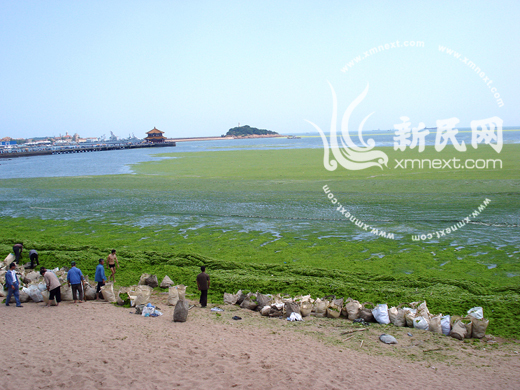Qingdao, which will host the Olympic sailing competitions in August, will spend at most half a month to clean the algae invading, local government announced at a news conference on Sunday.

The sailing-venue city's coastline has been coated with an algae bloom since late May. A bright green covering of algae can be seen smothering beaches and extending out several hundred meters, about 550 kilometers southeast of Beijing.
The algae, namely enteromorpha prolifera, was firstly detected on May 31st 60 sea miles east off the Dagong Island by the North China Sea Branch of the State Oceanic Administration and fishermen working on the sea.
Experts found the algae was exotic which flew from the central region of the Yellow Sea and would cause no influences on the water quality of the sea off Qingdao coast.
Wang Shulian, vice director of Qingdao Oceanic and Fishery Department, told reporters that the outbreak of algae had not substantial link to the environmental conditions and water quality of Qingdao's offing.
"The algae is of various sorts, which will prosper under satisfying temperature and salinity of sea water", said Wang.
However, the sudden invasion of algae has been to some extent affecting the normal order of the preparation for the sailing teams for the upcoming Olympics Games.
Sailors from at least 30 countries and regions are training in Qingdao for the Olympics, which will open on August 8.
Yuan Zhiping, assistant of the Chairman with the Qingdao Olympic Sailing Committee, complained that the algae has covered part of the training area and sometimes blocked the sailing routes.
Statistics showed that as of Saturday the algae had affected a total sea area of 13,000 square kilometers, four hundred out of which was covered by the foreign stuff.
To make it worse, more than 32 percent, or 15.86 square kilometers of the guarded sea area for Olympic sailing competition, was also covered up.
In order to assure the smooth going to the Olympic sailing events, Qingdao had mobilized more than 10,000 labor forces and over a thousand vessels to clean up the algae in the sea. Up till now more than 100,000 tons of algae has been weeded out.
Wang said besides just cleaning, more methods, such as blocking the further inflow of the algae, would also be adopted to accelerate the speed.